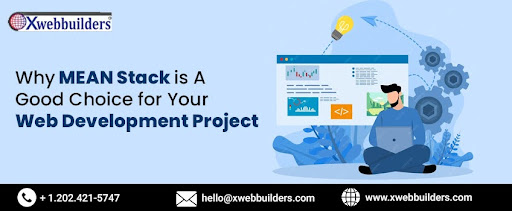
July 04, 2025

When embarking on website development services, choosing the right technology stack is crucial for its success. One popular choice is the MEAN stack, which stands for MongoDB, Express.js, Angular, and Node.js. This combination of powerful technologies offers numerous advantages, making it a good choice for web development projects. In this article, we will explore the reasons why the MEAN stack is favored by developers. From the flexibility and scalability of MongoDB as a NoSQL database, to the efficiency of Express.js for building web applications, the versatility of Angular for creating dynamic front-end experiences, and the speed and event-driven architecture of Node.js for server-side development, the MEAN stack provides a comprehensive and cohesive solution for developing robust and high-performing web applications.
The MEAN stack is a popular and powerful technology stack used for web application development. It is an acronym that stands for MongoDB, Express.js, Angular, and Node.js. Each component of the MEAN stack brings unique strengths and advantages to the development process. MongoDB is a NoSQL database that offers flexibility and scalability. It allows developers to store and manage large amounts of data in a schema-less format, making it easy to adapt to changing requirements. Express.js is a lightweight web application framework for Node.js. It simplifies the process of building robust and scalable web applications by providing a set of features and tools for routing, middleware, and handling HTTP requests and responses.
Angular is a powerful front-end framework developed by Google. It provides a comprehensive set of tools and features for building dynamic and responsive user interfaces. Angular follows the model-view-controller (MVC) architecture, allowing developers to create complex front-end applications with ease. Node.js is a server-side JavaScript runtime built on Chrome's V8 JavaScript engine. It enables developers to build highly efficient and scalable server-side applications. Node.js utilizes an event-driven, non-blocking I/O model, which makes it suitable for building real-time applications that require high performance.
The combination of MongoDB, Express.js, Angular, and Node.js in the MEAN stack allows for a seamless development workflow. It provides a cohesive and consistent JavaScript-based environment for both front-end and back-end development, enabling developers to build full-stack web applications using a single programming language. The MEAN stack is particularly well-suited for developing real-time applications, single-page applications, and applications that require rapid prototyping and scalability.
Using the MEAN stack (MongoDB, Express.js, Angular, and Node.js) for web development offers a range of benefits, and any website development agency will lay proof. Here are some key pointers highlighting the advantages of using the MEAN stack:
Single Language: MEAN stack enables end-to-end development in a single programming language, JavaScript. This eliminates the need to switch between different languages for front-end and back-end development, streamlining the development process and reducing complexity.
Full-Stack JavaScript: MEAN stack allows developers to work seamlessly with JavaScript on both the server-side and client-side. This foster's code reusability, simplifies maintenance, and promotes a consistent development workflow.
Scalability and Performance: Node.js, a key component of the MEAN stack, is known for its scalability and high-performance capabilities. It utilizes an event-driven, non-blocking I/O model, which enables handling a large number of concurrent connections and delivering fast response times.
Rapid Prototyping: The MEAN stack provides a comprehensive set of tools and frameworks that facilitate rapid prototyping. Angular, a robust front-end framework, combined with Node.js for the server-side, enables developers to quickly create and iterate on prototypes, reducing time to market.
NoSQL Database: MongoDB, the NoSQL database in the MEAN stack, offers flexibility and scalability for handling diverse data types. Its document-based structure allows for easy storage, retrieval, and manipulation of data, making it well-suited for agile development and adapting to changing project requirements.
JSON-Based Communication: JSON (JavaScript Object Notation) is used as a common data format throughout the MEAN stack. This facilitates seamless communication between the client-side and server-side components, simplifying data exchange and integration.
Extensive Community and Resources: The MEAN stack benefits from a large and active community of developers. This community provides abundant resources, tutorials, and libraries, making it easier to find support and solutions for any development challenges.
Cloud Compatibility: The MEAN stack is well-suited for cloud deployment and modern infrastructure. Node.js is particularly compatible with cloud platforms, allowing developers to take advantage of auto-scaling and other cloud services.
Maintainability and Collaboration: MEAN stack applications are easier to maintain due to the consistent codebase and modular structure. Additionally, with the single-language approach, developers can collaborate more effectively, improving team productivity and code quality.
Cost-Effectiveness: Using the MEAN stack can be cost-effective for businesses. The availability of open-source technologies and the reduced need for multiple programming languages and frameworks can lower development costs and time-to-market.
The MEAN stack (MongoDB, Express.js, Angular, and Node.js) offers several advantages that make it stand out as a preferred choice for web development compared to other programs. Here are key reasons why the MEAN stack is considered superior in many aspects:
Full JavaScript Stack: One of the significant advantages of the MEAN stack is the use of JavaScript throughout the entire development process. With MEAN, developers can write both front-end and back-end code in a single language, which promotes code reuse, reduces context switching, and improves development efficiency.
Isomorphic Nature: The MEAN stack allows for isomorphic or universal JavaScript development. This means that the same JavaScript code can be executed on both the client-side and server-side, resulting in enhanced performance and seamless rendering of web pages. Isomorphic applications built with the MEAN stack can achieve faster loading times and better search engine optimization.
NoSQL Database: MongoDB, the NoSQL database used in the MEAN stack, offers greater flexibility compared to traditional relational databases. It allows for schema-less data storage, which means that the data structure can be easily adapted and modified as the project evolves. This flexibility is particularly beneficial for agile development and handling large amounts of unstructured or semi-structured data.
Scalability and Performance: Node.js, the server-side component of the MEAN stack, is known for its excellent scalability and performance. It utilizes an event-driven, non-blocking I/O model that enables handling a large number of concurrent connections efficiently. This makes MEAN stack applications highly scalable, capable of handling heavy loads, and delivering fast response times.
Rapid Development: The MEAN stack provides a comprehensive set of tools and frameworks that facilitate rapid development. Angular, a powerful front-end framework, combined with Node.js for the server-side, allows for quick prototyping and the creation of feature-rich web applications. The MEAN stack's modular and component-based architecture also promotes code reusability, reducing development time and effort.
Community and Resources: The MEAN stack benefits from a vibrant and active developer community. This community provides extensive resources, libraries, tutorials, and support forums, making it easier to find solutions to development challenges and staying up to date with the latest trends and best practices.
Cost-Effectiveness: The MEAN stack offers cost-effectiveness by leveraging open-source technologies. MongoDB, Express.js, Angular, and Node.js are all open-source, eliminating the need for expensive licensing fees. Additionally, the use of a single programming language and the availability of reusable code components contribute to faster development cycles, reducing overall project costs.
Cloud Compatibility: The MEAN stack is highly compatible with cloud platforms and modern infrastructure. Node.js, in particular, is well-suited for cloud deployment and works seamlessly with cloud services, auto-scaling capabilities, and microservices architectures. This compatibility enables developers to take advantage of the scalability and flexibility offered by cloud platforms.
In conclusion, the MEAN stack offers numerous advantages that make it a strong choice for web development projects. With its full JavaScript stack, developers can leverage a single language for both front-end and back-end development, promoting code reuse and efficiency. The flexibility of the NoSQL database MongoDB allows for easy adaptation to evolving project requirements. The scalability and performance of Node.js ensure the smooth handling of concurrent connections. Rapid development, a supportive community, cost-effectiveness, and compatibility with modern infrastructure and cloud platforms further contribute to the appeal of the MEAN stack. Choosing the MEAN stack for your web development project can lead to efficient development, robust applications, and a seamless end-user experience.For more information or to avail services of our website development agency in Ashburn USA, visit Xwebbuilders.com .